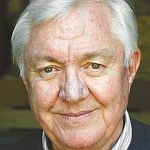 (Host) This past week, the visit of Israeli Prime Minister Benjamin Netanyahu to Washington generated much new talk of war with Iran. Today, commentator and retired ABC News diplomatic correspondent Barrie Dunsmore tells us where prospects for such a war apparently now stand.
(Host) This past week, the visit of Israeli Prime Minister Benjamin Netanyahu to Washington generated much new talk of war with Iran. Today, commentator and retired ABC News diplomatic correspondent Barrie Dunsmore tells us where prospects for such a war apparently now stand.
(Dunsmore) It was hard to escape a sense of the inevitability of war. Prime Minister Netanyahu was in Washington to meet with President Obama – and to speak to the powerful pro Israel lobby known as AIPAC about the Iranian nuclear threat. Netanyahu repeatedly made the case that a nuclear Iran is an existential threat to Israel. He strongly implied Israel may soon have to launch air strikes to destroy that nuclear program.
President Obama clearly recognizes that Iran indeed poses a national security threat. But broad perceptions that he is “throwing Israel under the bus” – to use Mitt Romney’s favorite expression – weaken Obama politically and reduce his options in trying to avoid still another war.
So throughout the week, Mr. Obama met these two challenges head on. The president dismissed Republican presidential wannabes for being much too “casual” about war and for not being honest with the American people about its consequences – namely, that an attack on Iran will immediately lead to skyrocketing gasoline prices but could also become another long and costly conflict.
Mr. Obama argued forcefully that now is not the time to start bombing Iran because tough new sanctions and a new round of nuclear talks with the Iranians are expected in the coming months. Meantime, it’s the joint conclusion of all United States intelligence agencies that Iran has not yet made the fateful decision to become a nuclear power – so war need not be the immediate option.
But President Obama also made some key concessions to Mr. Netanyahu. He ruled out the policy of containment to deal with a nuclear armed Iran. Containment and mutual assured destruction saved the world from nuclear annihilation during the five decades of the Cold War, but Netanyahu and his hawks weren’t buying it.
The president explicitly promised he would use force if all else failed to stop Iran from becoming a nuclear power. And notably, he described a nuclear Iran as a threat, not just to Israel, but to America and the entire Middle East.
With these concessions, Obama hoped to get an agreement from Netanyahu that Israel will give sanctions and diplomacy sufficient time to work. Such a commitment was not made – at least not publicly.
Amid all the war talk at AIPAC this week, there was one speech which unfortunately got almost zero media attention in this country. This is part of what Israel’s much respected president Shimon Peres had to say to and about President Obama.
“Mr. President, I know your commitment to Israel is deep and profound. Under your leadership, security cooperation between the U.S. and Israel has reached its highest level. Ladies and Gentlemen, we have a friend in the White House. He reflects the values that make America great and make Israel secure. Thank you, President Obama, on behalf of my people."
Even as war is debated, these words from one of the giants of modern day Israel are a message that Americans and Israelis would do well to keep in mind.